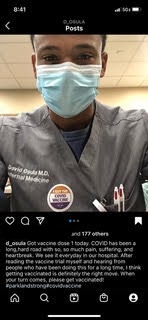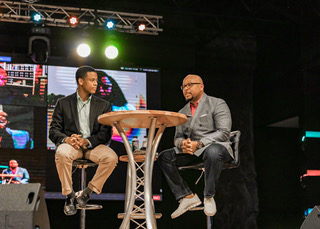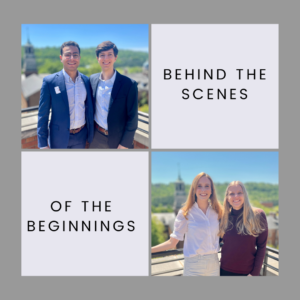By Jasmine E. Crenshaw; July 14, 2021
It’s been five years since Dr. David Osula finished his Alabama Schweitzer Fellowship, and he has carried lessons learned as a Fellow into his current work as an Internal Medicine Resident at the University of Texas Southwestern. For his project, Dr. Osula, a UAB School of Medicine alumnus, worked with the Academy of Health Sciences at George Washington Carver High School in Birmingham, AL to develop a mentoring program where students were exposed to science and healthcare opportunities. (The mentoring program is still ongoing.)
As conversations increased around the COVID-19 vaccines, Dr. Osula began to use his Instagram page to combat misinformation about getting vaccinated. We recently spoke to David about his work post-Fellowship and the impact of his digital vaccine education efforts online and off.
Q: Where do you currently work? What’s your current position?
A: I currently work as a 3rd year Internal Medicine Resident at the University of Texas Southwestern [UTSW] in Dallas, Texas.

Q: What does your day-to-day look like?
A: As an Internal Medicine Resident, my day-to-day is very variable depending on where I’m rotating. It can vary from 28-hour shifts in the ICU to regular 8 to 5 shifts in clinics, to even time spent in the lab doing research. Overall, I spend the majority of my day-to-day in the hospital or in clinics on direct patient care!
Q: It’s been five years since the end of your Fellowship year. What’s the biggest lesson learned from your time as a Fellow that has stayed with you?
A: The Schweitzer Fellowship emphasized going deeper than just providing education, but rather seeking to achieve behavior change within our population. That model is incredibly pertinent to my day-to-day work with my patients, as I work with my patients to improve their health. The key is to do it in a similar way that we did with our Schweitzer projects- by working to build trust, and asking questions first, rather than simply going straight in with your own agenda. Then, you find common ground, and then you work to achieve change.

Q: What type of impact does your Fellowship experience have on your current work? How have you been able to utilize the skills and lessons learned in your current career?
A: I use lessons learned from our advocacy curriculum and discussions from the Schweitzer Fellowship today in my COVID vaccine advocacy efforts. As the Community Outreach Co-chair for one of our organizations at UTSW, we partnered with UT Southwestern, local barbershops, and other community organizations to host a series of COVID Vaccine Q&A Sessions for members of the Dallas-Fort Worth (DFW) community. Developing strategic partnerships were key in making this happen. Establishing my community partnership with Carver High School during my Schweitzer Fellowship helped me to develop skills to make this happen.
Q: You’ve utilized Instagram as a platform to engage and demystify COVID-19 vaccine concerns with your audience. What prompted that decision?
A: Instagram provides a visual way for me to spread positive messaging about COVID vaccines. First, there is unfortunately a lot of misinformation out there about the vaccines, so we have to play our part to combat that with factual, research-based info. But secondly, it provides a means to share my personal experiences of why I got vaccinated, who I did it for, etc. to peers that I may not see often, but that I can influence positively from afar! Finally, I also used Instagram to amplify the voices of other healthcare providers by liking, sharing, and commenting, including other pro-vaccine movements like #ThisisourShot and #Vacunateya.
Q: What type of impact have you seen due to your digital efforts (such as more people vaccinated, other health care professionals sharing their vaccine stories, etc.)?
A: I’ve gotten a number of questions from people in my Inbox in response to my posts, asking about different aspects of getting vaccinated. A few have messaged me that they have chosen to get vaccinated now! Some have told me their hesitations, but that I was able to alleviate some of their fears and that they would continue to think about it. I’ve also been able to encourage several of my peers in healthcare to share their own stories as well, and therefore reach their sphere of influence. I have gotten the occasional anti-vaxxer message as well, but I’m definitely not going to let that stop me!
Q: What is a piece of advice for someone trying to convince their loved ones to get vaccinated? What would be the first step?
A: The first step is to ask questions first to try to get at the root of their fears or concerns. Do NOT use a judging tone or try to make people feel guilty-that generally is not effective. DO talk about how getting vaccinated can help family members feel safe when spending time together, especially with other older family members who might be at risk. DON’T tell them to do it for the good of society, or the good of others in a general sense as that hasn’t been shown to be effective. DO normalize the fact that there is a good chance that you could have side effects, but they are generally mild and short-lived. Tell them what to expect. DON’T try to sugarcoat it or hide the fact that they may have side effects that can often be perceived as deceptive or insincere since it is widely known that side effects are common.
Q: What are some tips for someone who’s interested in using their social platforms to engage others about COVID or other public health issues?
A:
- As best as possible, keep your posts concise and to the point.
- If you can, use graphics and images to catch people’s eyes.
- Make sure to do your research beforehand. Use evidence-based resources like CDC, Kaiser Family Foundation, etc.
- Provide links to trusted resources with more information. You can include these in your posts or post common resources in your bio.
- If you have the time, you can ask people to DM (Direct Message) you or post with questions. If you don’t have time, then don’t. That’s okay.


